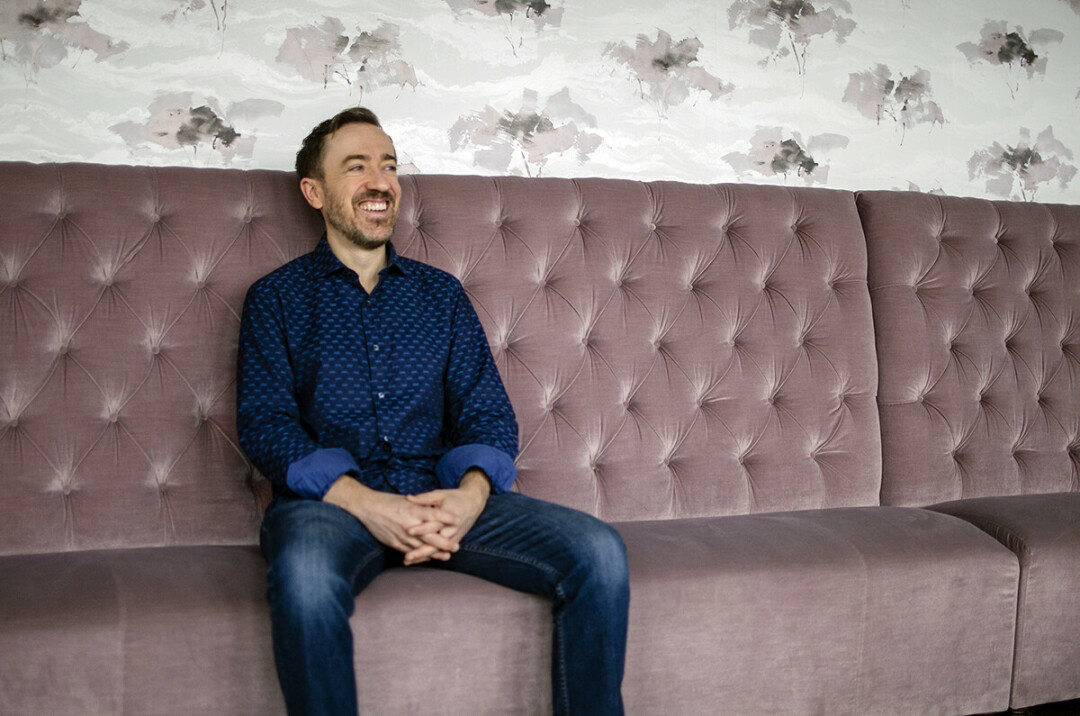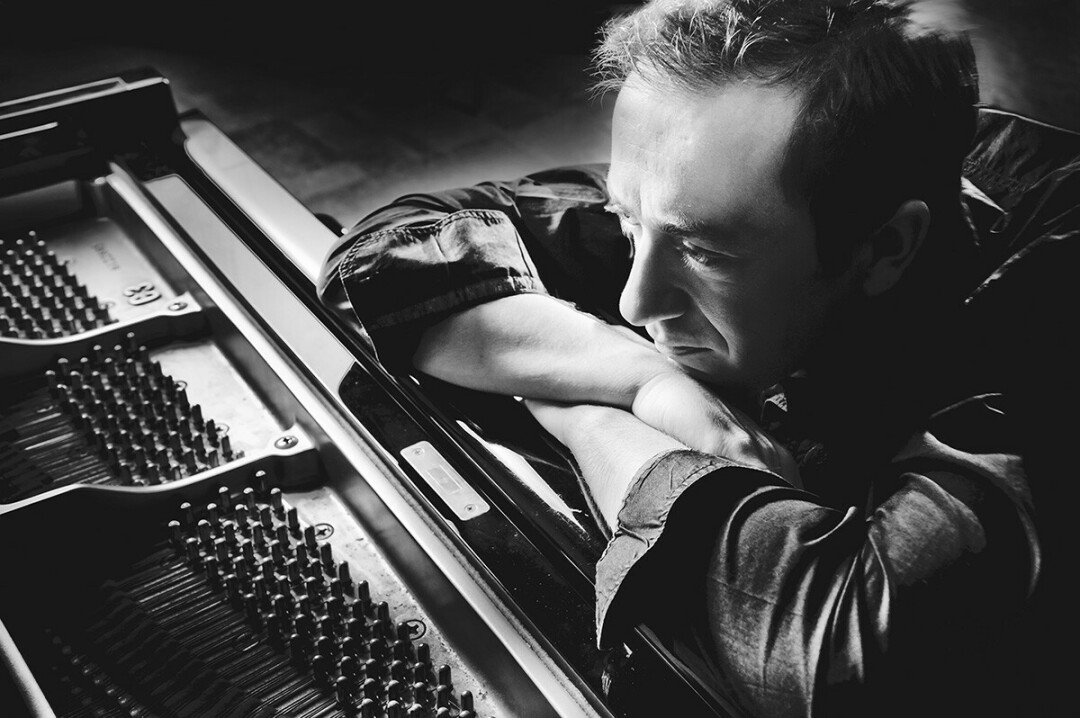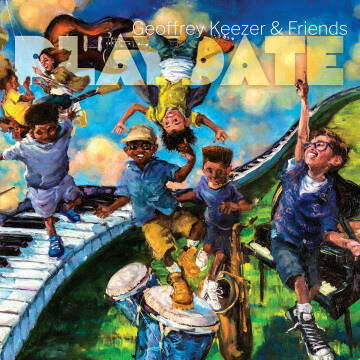FINDING REFUGE: Amid Pandemic and Personal Loss, E.C. Native Keezer Creates a Grammy Winner
jazz pianist’s acclaimed tune has roots in piece written for C.V. Symphony

Just like its composer, Geoffrey Keezer’s Grammy-winning jazz tune “Refuge” has roots in Eau Claire. Keezer grew up in the city, the son of two talented musicians and educators, and over the course of three decades his career as a jazz pianist has included more than 20 albums, collaborations with jazz greats and pop legends, near-constant touring, and four Grammy nominations.
While he now lives in New York, Keezer has returned to the Valley numerous times to perform, most recently for a 2021 concert in honor of his late parents, Ron and Mary. He’s been a guest artist several times at Eau Claire’s Jazz Fest, and in 2000 he was commissioned to write and perform a concerto for the Chippewa Valley Symphony Orchestra, of which his mother, who played the French horn, was a member. His father joined in with a Japanese taiko drum ensemble he had formed at UW-Eau Claire, where he taught for decades.
Twenty years later, the world changed dramatically for Keezer. All of his recording and touring came to a sudden halt in 2020 because of COVID-19, and he found himself at home with his wife, vocalist Gillian Margot, and their young child. The year brought other changes, too: Both of Keezer’s parents passed away in 2020, though not of COVID.
”
As artists and composers, sometimes we’re holding these melodies in our head for a long time, or maybe they’re just bubbling under the surface or in our unconscious or something.
GEOFFREY KEEZER
ON THE THEMES IN THE GRAMMY-WINNING "REFUGE," WHICH COME FROM A CONCERTO FOR PIANO AND ORCHESTRA HE WROTE IN 2000 FOR THE CHIPPEWA VALLEY SYMPHONY ORCHESTRA
It seems thoughts of home – near and far – stirred something in Keezer, resurfacing the themes he wrote for his hometown symphony years before.
“As artists and composers, sometimes we’re holding these melodies in our head for a long time, or maybe they’re just bubbling under the surface or in our unconscious or something,” Keezer said in a recent phone interview. “And then you revisit things you did and you come back to them and they’ve transformed somehow and you write a new version of it.”
That new version became “Refuge,” the lead track on Playdate, Keezer’s latest album, which was released last August. The tune won the Grammy for Best Instrumental Composition at the 65th Annual Grammy Awards on Feb. 5. The award puts Keezer in some legendary company – that Grammy category has been won by the likes of Duke Ellington, Elton John, and John Williams — but he’s taking the honor in stride.
“It’s a nice way for us all to get together in Los Angeles and run into friends and colleagues that we don’t get to see all the time,” he said of the Grammys. “We’re really all in it together. And it’s fun. It’s not a competition, really.”

Keezer’s talent blossomed early: He was already playing in jazz clubs as a teenager in the 1980s. Bob Baca – longtime director of jazz studies at UWEC – recalls meeting Geoffrey in 1986 when he first came to Eau Claire. Even at that young age, Baca remembers, Keezer was the best pianist he’d ever heard. Baca sent a tape of Keezer to trumpeter Dave Herndon, a friend in the jazz hotbed of New York, for his assessment. “His reply was that he sounded like 100 other players in New York City,” Baca said. Keezer had absorbed and reflected the styles of musical innovators who had come before. “One year later,” Baca said, “when Geoffrey was 18 years old, I sent another recording, and there it was – his own unique style at such a young age.”
Baca continued: “A handful of musicians have reached their own unique sound and style. Ellington did. Monk did. … Geoffrey Keezer did at under 20 years old.”
Keezer’s talent reflects positively on the fertile musical ground provided by Eau Claire, as well as by Keezer’s parents, Baca added.
“Ron and Mary were always Geoffrey’s greatest fans,” he said. “Because Geoffrey was their son and they loved him limitlessly, they were able to understand his genius better than anyone.”

That collaborative approach is exemplified by Keezer’s career, in which he’s performed alongside an impressive list of musicians (from Dizzy Gillespie to Sting), toured as a solo artist, and led his own combos. The latter was the case for Playdate, in which Keezer assembled a band that included longtime friends like saxophonist Ron Blake and new collaborators such as fellow keyboardist Shedrick Mitchell.
“Luckily all the people I wanted to play on it were in town,” Keezer said. “It just comes down to fantasy football. Who do I want on my team for this project?”
The ensemble – and the album’s title – reflects the modern reality that Keezer knows well as a parent.
“I grew up in Eau Claire, and all my best friends lived on the same street, and we ran around in the ’70s, and as long as we were home for dinner, nobody really bothered with where you were,” he said. “But now, of course, you have to organize play dates for your kids and book things three weeks in advance, and that was just it: I thought these are musicians that I have close personal connections with, and we’ve known each other for a long time. Let’s just get together and play and make some music. And that was the idea behind Playdate.”
In that way, the collaboration that led to Playdate was similar to the jam sessions of Keezer’s adolescence. “It wasn’t just me by myself practicing in my basement,” he recalls. “I had a whole group of like-minded friends who were all trying to learn to play jazz and we were all listening to records together. So it really does take a community.”
Today, that community includes a variety of performers, most notably Keezer’s wife, Margot, with whom he’ll perform in the coming weeks in clubs across the West Coast.
Will adding “Grammy winner” to his bio boost Keezer’s career? “That remains to be seen,” he says with a laugh. “We shall see what happens. But it’s a nice thing to have on one’s résumé, I suppose.”
Keezer’s latest album, Playdate, can be purchased online at geoffreykeezer.com.


















